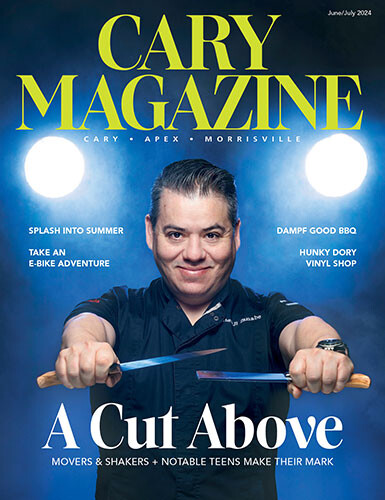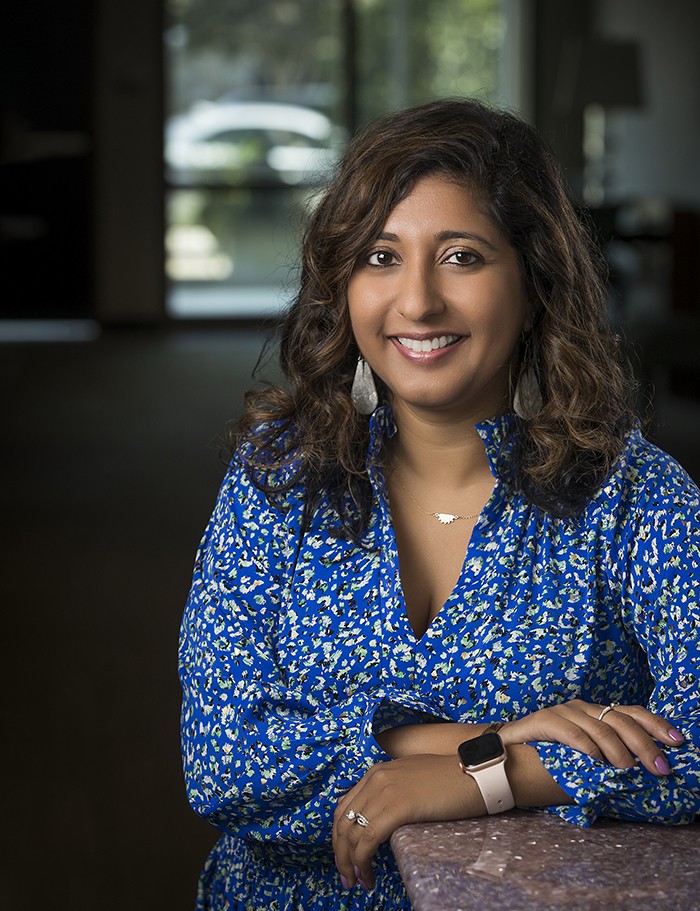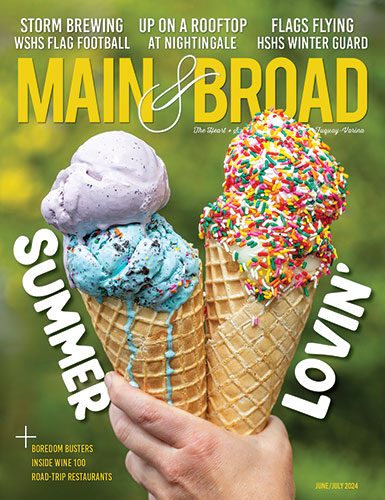Chavi Khanna Koneru grew up in the Triangle, wanting to change the world.
After getting a law degree from UNC-Chapel Hill, she headed to Washington, D.C., sure that her future lay far beyond the South. As the child of Indian immigrants, Koneru says she often felt out of place in North Carolina — but the place wouldn’t let her go.
“Part of me moving away was, ‘Oh, I don’t need North Carolina,’” she said. “Then I got (to D.C.) and was like, ‘This is such a huge part of me. I gotta come back.’ This is where I belong.”
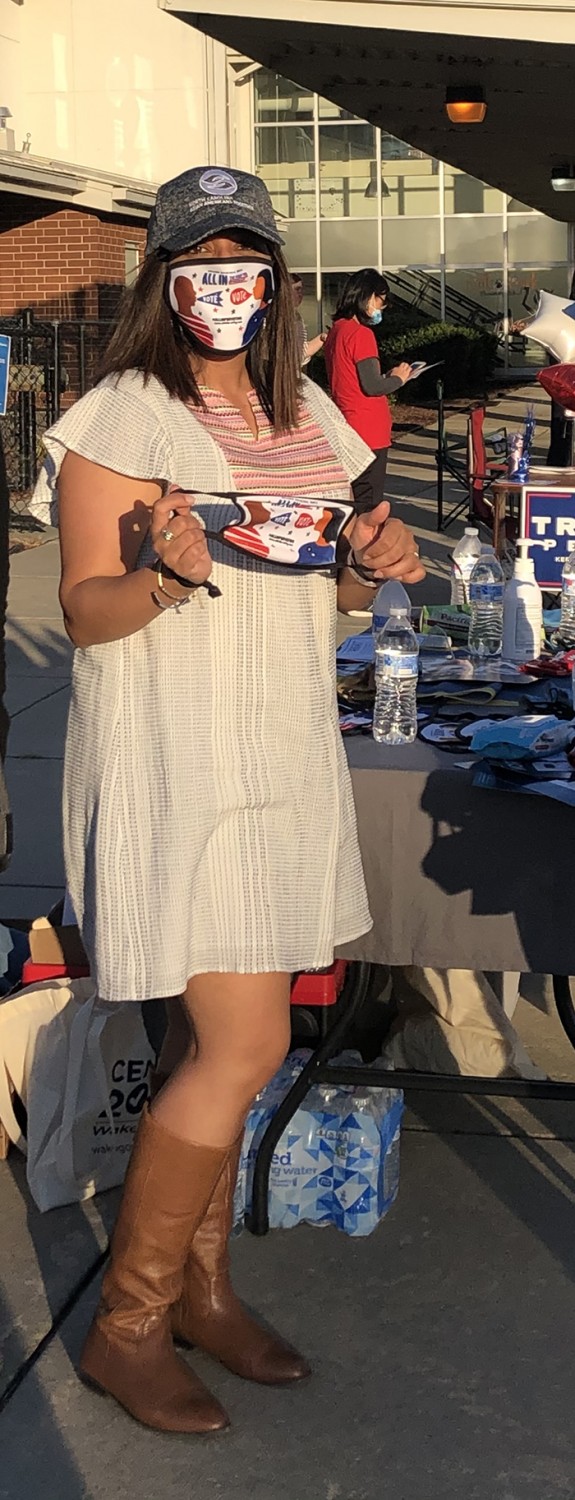
Chavi Khanna Koneru stands at an information table outside a polling place in Morrisville on Election Day 2020. Submitted photo.
Koneru, whose specialty is civil and voting rights law, also realized that she could change the world starting at home in North Carolina. The local Asian American community was growing rapidly, but language barriers prevented many citizens from voting. Koneru was sure she could help.
In 2016, she and co-founder Ricky Leung launched North Carolina Asian Americans Together, a nonpartisan group with the goal of increasing civic engagement in the state’s pan-Asian community. They soon realized how much their efforts were needed.
“We did this research and found out that 70% of the Asian American community had never been contacted by anyone about an election,” Koneru said.
While many registered voters get inundated with political calls before an election, in 2016, the majority of Asian Americans in North Carolina had received no calls, not from candidates, not from political parties, no one. And if the numbers were that low before a big general election, what about smaller, municipal contests?
“That gap became very, very clear,” she said.
One of NCAAT’s first efforts was to send multilingual volunteers door-to-door providing nonpartisan information about the 2016 election. They targeted neighborhoods in Morrisville like Breckenridge, the precinct with the highest percentage of Asian Americans in the state.
Roughly 40 different Asian languages are spoken here, Koneru says. While NCAAT doesn’t have translators in all of those languages, for the 2020 election, volunteers were able to provide support in 13 of them.
Speaking the same language goes beyond mere communication, Koneru says. Many Indian Americans learned English in school, but when volunteers would come to the door and greet residents in Hindi or Urdu, they weren’t treated like strangers.
“Our canvassing efforts have been positive in a way that I’ve never experienced before in any other kind of voter outreach,” Koneru said. “People don’t slam the door in your face. They invite you in to eat what they’re eating for dinner, because you’re someone from the community, and that makes a huge difference.”
These personal connections paid off. According to voter analysis from AAPI Data, the Asian American vote in North Carolina increased by 52%, or by 28,000 votes, from the 2016 election to the 2020 election.
“Clearly, she’s a visionary,” said Juliana Cabrales, a former NCAAT board member.
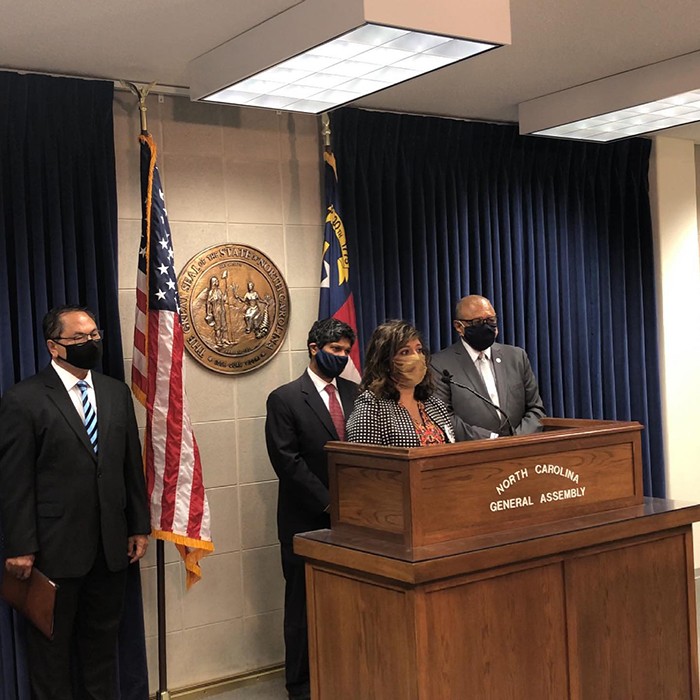
Chavi Khanna Koneru speaks at a lectern during the first Asian American Advocacy Day held at the N.C. General Assembly in May. Submitted photo.
When Koneru started doing her initial outreach efforts more than five years ago, it was hard to make a case for recruiting Asian American voters, Cabrales says. Then, the population of eligible voters was relatively small. The 2020 election proved Koneru correct.
“She … had the vision as to what long-term engagement could look like, and, along with her co-founder, built an organization from the ground up that has grown tremendously,” Cabrales said. “Identifying that potential for growth, potential for engagement, and carrying it out, has been really amazing.”
Now a nonprofit with 12 full-time employees, NCAAT’s programs include youth leadership training, community education and advocacy, and immigration assistance.
“Where we are now, five years later, is majority due to her,” said Leung, the senior director of programs, communications and outreach at NCAAT.
Along with her leadership, Leung appreciates his co-founder’s legal expertise. During a conversation with local community leaders, Vimala Rajendran, the owner of Vimala’s Curryblossom Café in Chapel Hill, mentioned that she wasn’t a citizen. Koneru helped the entrepreneur through that process, and Rajendran is now running for a seat on the Chapel Hill Town Council.
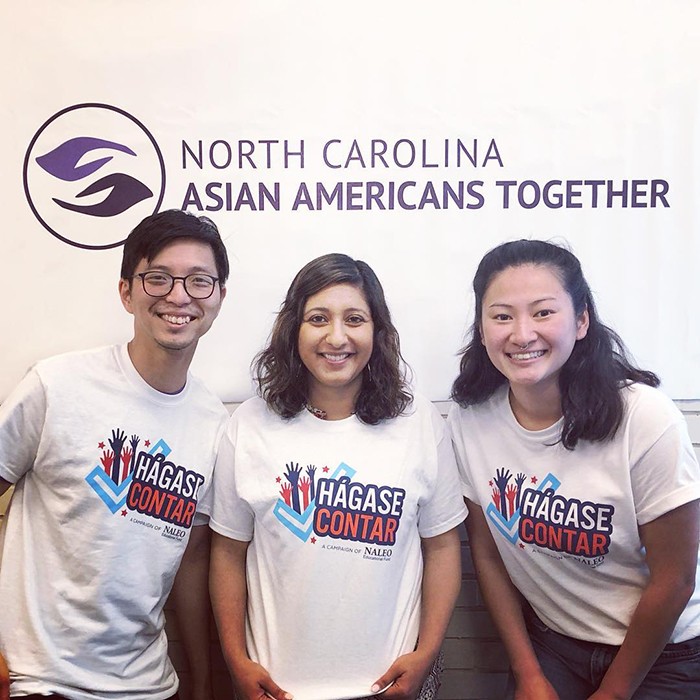
Ricky Leung, left, and Chavi Khanna Koneru, center, and another volunteer work on census outreach in April 2019. Submitted photo.
“That’s a story of exactly why we do the work that we do,” Leung said, “to help support our existing community, our existing community leadership, to get to that point where we can get, not just representation in a sense of voting for people, but also people from our communities running for office.”
Koneru says it’s amazing how much NCAAT has been able to accomplish in the last five years. Still, tragic events like the March shootings targeting Asian women in Atlanta demonstrate how much still needs to be done.
“If we want to change the world, as corny as that sounds, it’s not going to happen if we dwell on the bad stuff,” Koneru said.
One result of highly visible anti-Asian discrimination is that more people are willing to educate themselves about anti-Asian hate. Koneru has received many more invitations to speak on forums and in corporate settings, and she accepts nearly every opportunity.
“I have a perspective to share that isn’t being shared otherwise, and it’s so important,” Koneru said. “Because I think, at the base of all hate and discrimination, really is a lack of education and understanding of other people.”
Koneru, who lives in Raleigh with her husband, their five-year-old son and one-year-old daughter, says her children also help her focus on the future.
“There is no better motivation than wanting your kids to have a better experience than you did,” she said. “I don’t want them to have that feeling of ‘I don’t belong here.’ That’s what motivates me. I know they belong, and I want to make sure everyone else also knows that.”
- Wall to Wall
- Women of Western Wake: Jackie Locklear
- Women of Western Wake: Matty Lazo-Chadderton
- Pack and Play
- Nonprofit Spotlight: Toward Zero Waste
- Small Business Spotlight: Six Foot Fit
- Women of Western Wake: Christine Vannais
- Women of Western Wake: Chavi Khanna Koneru
- Women of Western Wake: Veronica Bent
- Presenting the 2021 Women of Western Wake
- Things to Do: September 2021
- What’s Ahead for the 2021 N.C. State Fair
- Restaurant Profile: Lawrence Barbecue
- Liquid Assets: Copperline from Carolina Brewery
- Garden Adventurer: Impatient? Plant Autumn Crocus
